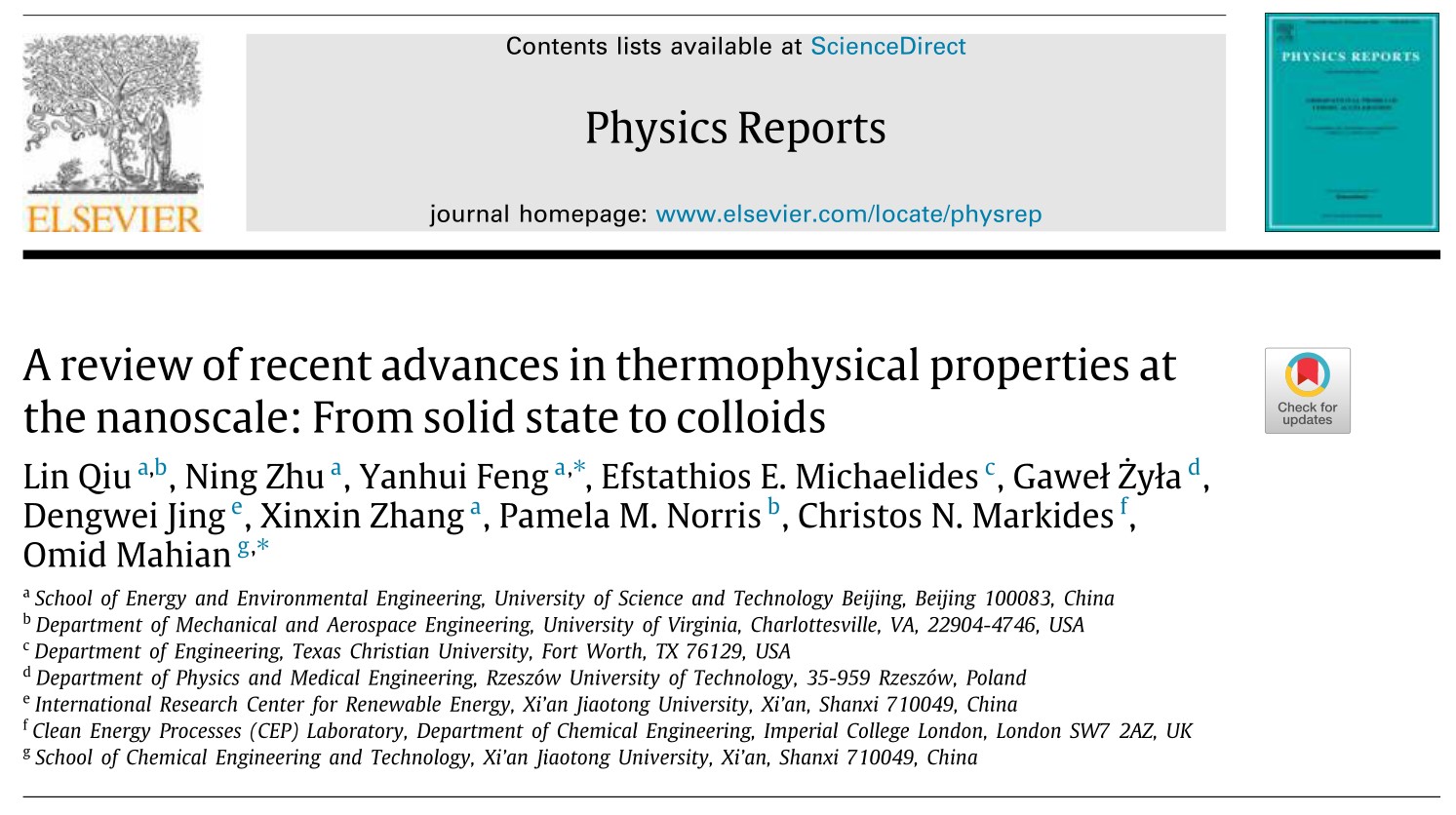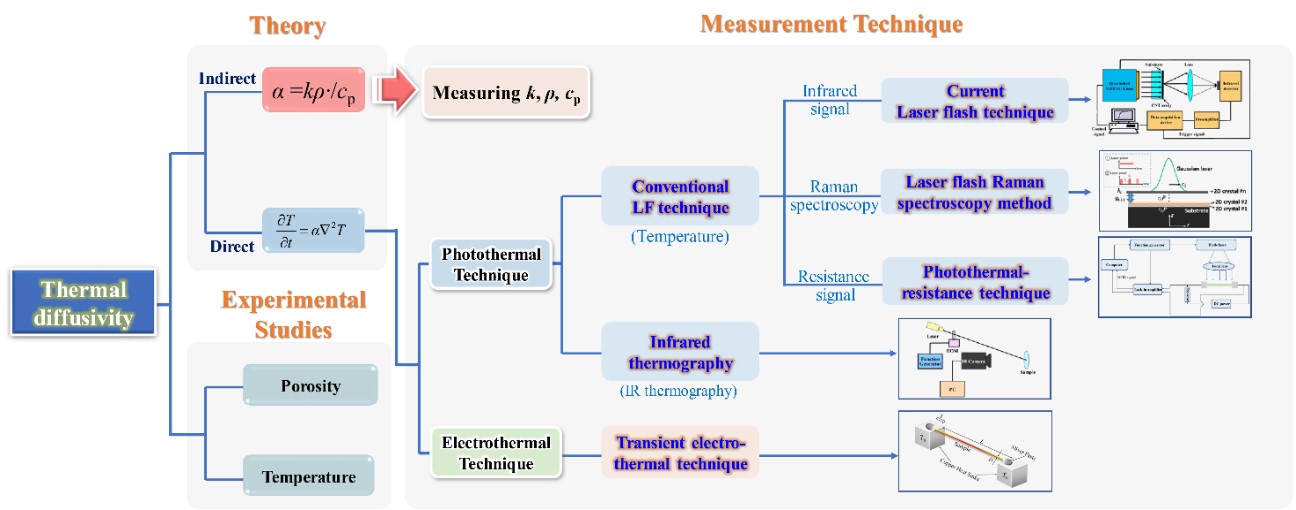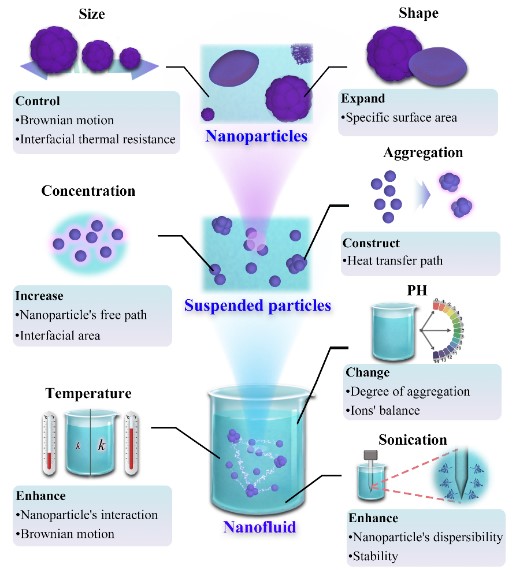
首页 > News & Notices > News
Professor Feng Yanhui's team has made periodic progress in the research of thermal properties of solid nanomaterials
Recently, Prof. Yanhui Feng’s group from the University of Science and Technology Beijing published a long review entitled "A review of recent advances in thermophysical properties at the nanoscale: From solid state to colloids" in the top physics journal-Physics Reports-Review Section of Physics Letters. The paper summarizes the application of data-mining in the research of thermophysical properties of nanomaterials, discusses the challenges and deficiencies in the current research, and puts forward research hotspots and directions.

Part Ⅰ mainly introduces the latest research progress of the thermophysical properties of solid nanomaterials, including theoretical and experimental research on thermal conductivity, specific heat capacity and thermal diffusivity. Among them, the development process of theoretical models, the widely used measurement techniques and the main factors affecting thermophysical properties are introduced in detail. At present, the thermal conductivity measurement techniques mainly include T-type method, 3ω method, T-3ω method, H-type method, Raman spectroscopy method and Time-domain thermoreflectance method. The main factors affecting thermal conductivity are grain size, grain boundaries, interface interactions, doping and defects, etc. For the study of specific heat capacity, the paper introduces the applicable conditions and principles of Dulong-Petit Law, Einstein model and Debye model, the measurement techniques include the 3ω method and the AC-calorimetric method. For thermal diffusivity, the more advanced measurement techniques are laser flash method, laser flash Raman spectroscopy method, infrared thermography, transient electro-thermal technique and photothermal resistance method, etc.

Part Ⅱ mainly introduces the latest research progress of the thermophysical properties of nanofluids, including the development process from classical to advanced theoretical models, experimental measurement techniques, and the main factors affecting thermal conductivity, specific heat capacity, density, dynamic viscosity. The classical models include Maxwell model for spherical nanoparticles, Hamilton model considering the shape of nanoparticles, Bruggeman model for high volume fraction nanoparticles, Yu-Choi model for nanolayers, Xuan model and Koo-Kleinstrener model for Brownian motion, etc. Advanced measurement techniques include transient hot-wire method, laser flash method, 3ω method, steady-state parallel plate method, and transient plane-source method. In addition, the effect of particle shape, size, volume fraction, agglomeration, temperature, pH value, and sonication time on thermal conductivity and dynamic viscosity is very important. Capillary viscometer, concentric cylinders viscometer, and cone and plate viscometer are widely used in experiments.

Finally, the paper summarizes the application of data mining in the study of thermophysical properties of nanomaterials, and briefly discusses the challenges and deficiencies at this stage, such as the preparation technology and cost of nanomaterials, the agglomeration of nanofluids, the interfacial thermal resistance hinders the synthesis of ultra-high thermal conductivity composite materials, etc., and proposes future research hotspots and directions.
“Physics Reports” is one of the most prestigious and influential international review journals in physics. The journal only invites well-known scholars to write reviews of frontier fields, which has an important leading and guiding role in the development of related fields. The first author of this review paper is Associate Prof. Lin Qiu from our university, and the corresponding authors are Prof. Yanhui Feng from our university and Prof. Omid Mahian from Xi'an Jiaotong University. In addition, some well-known scholars such as Prof. Pamela M. Norris from University of Virginia, Prof. Efstathios E. Michaelides from Texas Christian University, Prof. Gaweł Żyła from Rzeszów University of Technology, and Prof. Christos N. Markides from Imperial College London have also made an essential contribution to this paper. This review is the 65th paper published on Physics Reports since it was founded in 1971, with scientific institutions in mainland China as the first research institutes, the 8th paper published in the field of engineering thermophysics, and it is also the second paper published by Beijing scientific institutions in the field of engineering thermophysics.
Introduction to overseas co-authors:
Prof. Omid Mahian, Xi'an Jiaotong University, he is currently a member of the editorial board of《Energy》, an associate editor of the《Journal of Thermal Analysis and Calorimetry》, and a reviewer for more than 70 international journals. He was selected as a highly cited scholar in 2018. His recent research directions include the application of nanofluids in renewable energy (solar collectors and solar seawater desalination). He has published more than 140 SCI papers, with personal H-index as high as 41, and has been cited more than 5,000 times. In 2013, the paper "A review of the application of nanofluids in solar energy" published in the 《International Journal of Heat and Mass Transfer》was the most cited paper in the journal since 2012, and it is also one of the top 1% cited articles in the field of heat and mass transfer in 2016.
Pamela M. Norris is the Executive Dean in the School of Engineering and Applied Science and the Frederick Tracy Morse Professor of Mechanical and Aerospace Engineering in University of Virginia, US. After receiving her PhD from Georgia Institute of Technology in 1992 and completing post-doctoral studies at UC Berkeley with Chang-Lin Tien, she joined the faculty at UVA in 1994, where she founded both the Nanoscale Energy Transfer Lab and the Aerogel Research Lab. Today, she is recognized globally as a leading expert in both research fields. She routinely chairs, and speaks at, international conferences on those subjects and has published over 100 heavily cited referred journal papers. She holds patents for applications of aerogels in areas ranging from biological warfare detection, to lab-on-a-chip, to thermal insulation, along with patents for innovative thermal management techniques for jet-blast deflectors.
Professor Stathis Michaelides is currently the Tex Moncrief Chair of Engineering at Texas Christian University (TCU), US. He holds a B.A. degree (honors) from Oxford University and M.S. and Ph.D. degrees from Brown University. He was awarded an honorary M.A. degree from Oxford University (1983). Professor Michaelides was a member of the executive committee of the Fluids Engineering Division of the ASME (2002-08) and served as chair of the Division in 2005-2006. Prior to this he has served as chair (1996-1998) of the Multiphase Flow Technical Committee. He has published more than 140 journal papers and has contributed more than 240 papers and presentations in national and international conferences. He has also authored six books on: a) Particles, Bubbles and Drops – their motion and heat transfer (World Scientific, 2006); b) Alternative Energy Sources (Springer 2012); c) Heat and Mass Transfer in Particulate Suspensions (Springer 2013); and d) Thermodynamic and Transport Properties of Nanofluids (Springer 2014); Multiphase Flow Handbook, 2nd Edition (CRC Press); Energy, the Environment and Sustainability (CRC Press).
Gaweł Żyła, Professor of Experimental Physics, Rzeszów University of Technology, Poland, research and teaching staff, from 2019-University professor of the WMiFS ZFD research and teaching team. Former Visiting Professor at Istituto Nazionale di Ottica, Italy, Visiting Professor at Novi Sad University of the Republic of Serbia, Visiting Professor at Lund University, Sweden, Visiting Professor at Univesida de Vigo University, Spain , Visiting Professor, University of Rennes, France, Mahatma Gandhi University, India, Visiting Professor. In November 2018, the Rzeszow Polytechnic University President's Award was presented for publication in an international journal indexed by the Ministerial A (11). His main research interests are nanofluids, rheology, thermal conductivity, surface tension, and density.
Christos N. Markides is Professor of Clean Energy Technologies in the Department of Chemical Engineering of Imperial College London, where he heads the Clean Energy Processes (CEP) Laboratory, and leads the Energy & Environmental Engineering research theme and the cross-faculty Energy Futures Lab Energy Infrastructure research theme. He is also, amongst other, the Editor-in-Chief of journal Applied Thermal Engineering, on the Editorial Board of the UK National Heat Transfer Committee, the Scientific Board of the UK Energy Storage SUPERGEN Hub, and is a member of the Assembly of World Conferences (AWC) on Experimental Heat Transfer, Fluid Mechanics and Thermodynamics. He was awarded a First Class BA degree with Honours, a MEng with Distinction, a MA, and a PhD in Energy Technologies from the University of Cambridge. His current research interests focus primarily on the application of fundamental principles of thermodynamics, fluid mechanics, and heat and mass transfer to innovative and high-performance energy components, devices, technologies and systems for energy (heat, power, cooling) recovery, utilisation, conversion and storage, with emphasis on the efficient and cost-effective utilisation of renewable and waste heat, and solar energy.